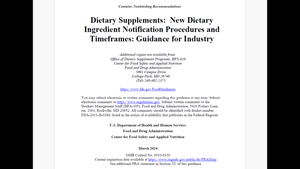Biopharma firm asserts oleander—possible COVID-19 treatment—is safe
Phoenix Biotechnology has studied oleander for a quarter century and is pursuing two very distinct avenues with FDA.
.png?width=850&auto=webp&quality=95&format=jpg&disable=upscale)
A biopharmaceutical firm stands by the safety of the plant compound oleander amid reports in the mainstream press that the Trump administration is being lobbied to support an unproven and dangerous product to treat COVID-19.
Andrew Whitney, director and vice chairman of Phoenix Biotechnology Inc. in San Antonio, Texas, said his company has studied oleander for a quarter century and is pursuing two avenues with FDA—to bring it to market as a drug to treat COVID-19 and separately to sell it as a dietary supplement.
Oleandrin is a molecule extracted from the Nerium oleander plant and specifically formulated for oral administration, according to Phoenix Biotechnology. In FDA phase 1 and 2 human clinical trials for a cancer application, the compound was shown to be safe, he told Natural Products Insider in an interview.
“People can get all caught up in this idea that oleander is this poisonous plant,” Whitney said. “The oleandrin molecule is a tiny subset of that plant and it’s all about concentration—the amount of it you consume.”
'Miracle of all time'
During an Oval Office meeting in July, oleandrin was promoted to Trump—with the backing of MyPillow CEO Mike Lindell and Housing and Urban Development Secretary Ben Carson, the news website AXIOS reported.
“This thing works,” Lindell said in a testy interview this week with CNN’s Anderson Cooper.
Lindell, who also sits on the board of directors of Phoenix Biotechnology and has invested in the company, told Cooper he’s been taking oleander since April.
“It’s the miracle of all time,” he proclaimed.
In laboratory experiments at the University of Texas Medical Branch (UTMB) in Galveston, researchers exposed green monkey liver cells to the coronavirus and introduced Phoenix Biotechnology’s product to see how it would react.
“In the course of that analysis, we got really remarkable results—an average 20,000-fold reduction in viral infectivity,” Whitney said, adding the reduction occurred within 24 hours.
UTMB also examined what happens if the cells were exposed to the product and the virus was introduced several hours later.
“That’s when you discover that the virus struggles to get a foothold,” Whitney said. “That starts to be very early evidence of what’s called prophylactic or preventative quality."
He added a caveat. "Nobody’s suggesting here that we need to run into the street yelling ‘eureka’ on the back of that work.”
Dr. Scott Weaver, a virologist at UTMB who participated in the in vitro study, said the lab results should be interpreted with caution, as noted in a paper on the issue.
“Any results from initial cell culture experiments do not necessarily predict that an antiviral drug will be effective in humans," he said in a statement forwarded by a UTMB spokesman. "The testing of antivirals on cells is only the first step, and promising results must be followed-up with animal testing. There are many drugs like this one that look promising during initial in vitro testing, but then fail later for a variety of reasons.”
Whitney said Phoenix Biotechnology also shared anecdotal evidence with FDA related to COVID-19 as well, although he confirmed such data was not public.
He dismissed what he described as a false narrative that the biopharma company doesn’t follow protocols and “blew into the White House like some type of tumbleweed.”
While Whitney acknowledged eating an oleander plant from someone’s back yard could be extremely toxic, he stressed the company’s extract, oleandrin, is safe, based on human oncological trials.
“Oleandrin in the proposed dosing is completely safe up to 16 times the proposed amount based off of Phase 1 and 2 human trials,” he said in an email through a spokesperson.
Warnings from experts
Botanical experts, on the other hand, warned oleander is dangerous and can even cause death.
"With respect to oleander, all parts of the plant are highly toxic, dangerous and life-threatening when ingested," Mark Blumenthal, founder and executive director of the American Botanical Council (ABC), a nonprofit, international member-based organization, said in a consumer advisory. “Consumers should not, ever, try to make a home-made remedy from or self-treat with oleander.”
A large white- or pink-flowering bush or small tree, oleander is grown as an ornamental plant in many parts of the U.S. and elsewhere, including North Africa, the Mediterranean and southwestern Asia, according to the advisory.
“All parts of the plant contain a poisonous substance called oleandrin, known technically as a cardiac glycoside, and other similarly toxic constituents,” ABC cautioned.
Still, Blumenthal described Phoenix Biotechnology’s research as “very promising,” and he emphasized “the distinction between a scientifically studied, chemically-defined experimental new drug compound from a widely known poisonous plant and a simple home-made pill, tea, or extract made from the plant’s various parts.”
'Who drinks a pint of oil?'
In highlighting how oleandrin can be safely produced, Whitney used the analogy of gasoline as a fraction of a barrel of crude oil.
A car cannot operate effectively or safely on a “barrel of crude oil,” but with the proper isolate equipment and expertise, “you can distill gasoline fraction out of that barrel of crude and run the car very safely and effectively on that,” he said.
More to the point, Whitney said the human clinical trials did not yield negative reactions to the product until 16 times the proposed dosage was administered. “That’s the difference between 70 miles an hour and 1,120 miles an hour on the freeway,” he said.
In a phase 1 trial, 46 patients received PBI-05204, Phoenix Biotechnology's new botanical drug—a Nerium oleander extract, according to a study in the journal Investigational New Drugs published in 2014. In a phase 2 trial involving PBI-05204, 42 patients were enrolled, with 38 of them analyzed, researchers noted in the journal The Oncologist published in 2020.
Based on the proposed dosage discussed with FDA, a person would need to take 600 dosages simultaneously to “reach a toxic level,” Whitney said. “In the course of doing that, you’d have to consume an entire pint of oil. Who drinks a pint of oil or takes 600 doses of anything? Nobody in their right mind.”
FDA safety concerns
An FDA spokeswoman declined to answer specific questions for this story and referred a reporter to a FAQ section about potential cures and treatments for COVID-19. In the FAQ, the agency said it has not approved any medicines to treat or prevent COVID-19.
FDA raised concerns about oleander in its response to a 1998 new dietary ingredient notification (NDIN) for oleander extract. Such notifications are provided to FDA to establish the safety of an NDI before it’s marketed in a supplement in the U.S.
“All parts of the oleander plant are poisonous to man and animals and serious adverse effects are associated with ingestion, inhalation and contact of mucus membranes with oleander or oleander extracts,” an FDA official, Lynn Larsen, stated in response to the notification in a letter dated Dec. 23, 1998.
He cited such adverse effects as abdominal pain, cardiovascular symptoms, diarrhea, nausea, peripheral neuritis and vomiting.
The NDIN had been submittted by Ozelle Pharmaceuticals Inc. in San Antonio.
Based on its review of NDIN records, the American Herbal Products Association (AHPA)—a trade group for the herbal products industry—noted it's "exceedingly rare for the agency to essentially reject a notification due to known safety concerns."
“Indeed, among the responses to the more than 1,000 NDI notifications released by FDA to date, AHPA identified only seven expressing known safety concerns in this manner,” the trade association said in a statement.
Whitney said Phoenix Biotechnology has been in conversations with FDA to bring the substance to market as a dietary supplement; and, when asked if the company had submitted an NDIN to the agency, he answered in the affirmative. FDA did not immediately confirm for this story whether it had received such a notice.
“We have submitted the application,” Whitney said. “We would love to see this out there as a dietary supplement, and we’re pursuing that avenue as well as the FDA drug track.”
Michael McGuffin, president of AHPA, addressed the company's strategy to bring oleander to the market as a dietary supplement. “Certainly, botanicals have a rich history of providing health benefits, and we encourage any and all research on any botanical," he said in an interview.
But Phoenix Biotechnology would need to overcome "the well-known safety concerns associated with oleander, and FDA has already spoken on this issue in the context of a new dietary ingredient notification," he explained.
The company would need to clearly describe conditions of use, dosage forms and quantities, demonstrating the "same reasonable expectation of safety that’s required of all dietary supplements before it could bring it to market," McGuffin added.
Loren Israelsen is president of the United Natural Products Alliance (UNPA), an international association representing the dietary supplement industry. UNPA consulted with several groups regarding oleander, including ABC, the National Center for Natural Products Research (NCNPR), British Columbia Institute of Technology (BCIT), National Institutes of Health Office of Dietary Supplements (NIH/ODS) and the American Herbal Pharmacopoeia (AHP).
All of them “universally confirmed that oleander is highly toxic to both humans and animals and is not recognized as a dietary ingredient or supplement,” Israelsen wrote in a memo to his colleagues.
The memo quoted Ph.D.-educated experts who raised concerns about the plant, including Paula Brown of BCIT and Ikhlas Khan of the NCNPR.
“While we strongly support continued and expanded research into the antiviral properties of botanicals (as well as their appropriate consumer use), this is not the way to do it,” Israelsen concluded. “UNPA will promptly inform the U.S. FDA if an oleander dietary supplement is promoted for sale.”
About the Author(s)
You May Also Like






.png?width=800&auto=webp&quality=80&disable=upscale)